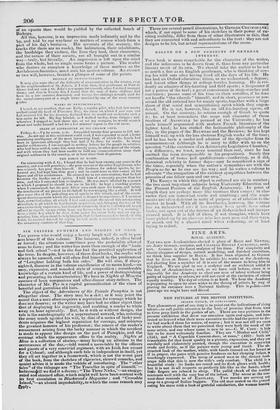SIR FRIZZLE PUMPKIN AND NIGHTS AT MESS. THE person who
would enjoy a hearty laugh will do well to pos- sess himself of this volume. The humour, indeed, is often broad or forced ; the situations sometimes pass the probability allowed even to farce ; and the writer has more than enough of the " knife and fork school "—nut in the fine but the practical application of the term. In despite, however, of these drawbacks, the reader will always be amused, and will often find himself in the predicament of "Laughter holding both his sides." He will also, if sharp- sighted, discover in the volume excellencies of no mean kind,—an easy, expressive, and rounded style of composition ; considerable knowledge of a certain kind of life, and a power of distinguishing and presenting its characteristics.! We have in Nights at Mess the essence of boon companions and after-dinner story-tellers. The character of Mr. Pye is a capital personification of the class of boastful and garrulous old liars. The object of the Adventures of Sir Frizzle Pumpkin is not altogether clear. The story may be a skit ; or it may point the moral that a man often acquires a reputation for courage which lie does not deserve; cr the writer may have had no other object than that of displaying his ingenuity, and enabling a reader to while away an hour agreeably. But, be it with or without design, the tale is the autobiography of a supernatural coward, who, entering the army much against his will, by dint of a series of lucky acci- dents acquires the highest reputation for courage, and achieves the greatest honours of his profession ; the source of the reader's amusement arising from the lucky manner in which the accident is made to appear like design on the part of Pumpkin, and the contrast which the appearance offers to the reality. Nights at Mess is a collection of stories,—many having an allusion to the occurrences of the day,—told round a mess-table by the officers and guests of a very convivial regiment, with an Irish bon vivant for a Colonel; and although each tale is independent in itself, yet they all set together in a framework, which is not the worst part of the book, from the sketches of character, shrewd remarks, and quaint advice it is made the vehicle of introducing. The " other tales" of the titlepage are "The Traveller in spite of himself,"— ludicrou4till we find it a dream ; "The Three Nicks,"—an exagge- rated and strained affair, which might well have been content with its first circulation in Blackwood's Magazine ; and "Crocodile Island,"—an absurd improbability, to which the same remark may
aPPIY.
There are several pencil illustrations, by GEORGE CRU I KSII A NK ; which, if not equal to some of his sketches in their power of ex- citing risibility, differ from those of other illustrators in this, that they are connected with and subordinate to the text : they are not designs to be let, but actual representations of the scene.


























 Previous page
Previous page